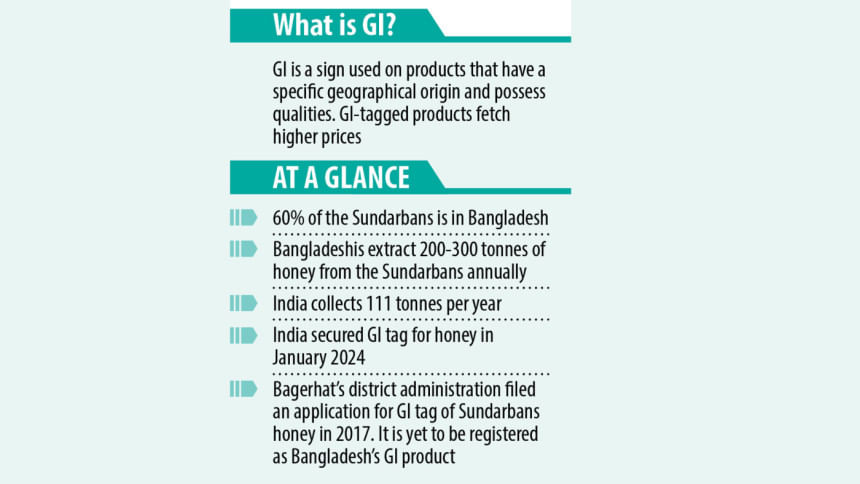Team up with India to protect shared GI: CPD

Bangladesh should explore potential avenues for joint protection of shared GI (geographical indication) with India and put in place a legal framework to safeguard the country's traditional products, said the Centre for Policy Dialogue (CPD) yesterday.
The suggestion comes after Sundarbans' honey was displayed by the neighbouring country as a GI product.
West Bengal Forest Development Corporation Ltd applied for GI rights for Sundarbans' honey on July 12, 2021, and the tag was issued on January 2, 2024, the think-tank said.
The information came to light through a tweet by the West Bengal Forest Department on May 16.
"This sole representation of the said product by India sparked questions in our minds as the majority of Sundarbans' territory lies within Bangladesh," said Debapriya Bhattacharya, a distinguished fellow of the CPD, at an event at its office in Dhaka.
Bangladesh's Department of Patent, Designs and Trademark (DPDT) has listed 31 GI products as of April 30, 2024. The list does not include the Sundarbans' honey.
The district administration of Bagerhat, however, filed an application for the GI tag of the Sundarbans' honey on August 7, 2017, and there has been no development since then, the CPD said.
"This is a rather astonishing example of administrative dereliction of duty. Thus, the GI of Sundarbans' honey in Bangladesh has remained unsecured," Bhattacharya said in a presentation.
He added Sundarbans' honey has been recognised as a GI product of India whereas Bangladesh did not give any importance to it.
Bangladesh is the primary extractor of the honey from the largest mangrove forest in the world. While official records are not available, 200-300 tonnes of the popular sweet substance are extracted from the forest annually.
This is not the first time, Bangladesh and India have faced a row over GI.
On February 1, 2024, India's Ministry of Culture announced that the West Bengal State Handloom Weavers Co-Operative Society secured the GI status for Tangail Saree under the name of 'Tangail Saree of Bengal'.
This triggered outrage and criticism from a large cross-section of Bangladeshi citizens. This prompted the government to unveil measures to secure the GI status for the Tangail sari. On April 25 this year, the GI certificate for Tangail Sari was issued.
Both countries have registered some other products, such as Nakshi Katha, Khirsapat Mango, Fazli Mango, Muslin, Jamdani Sari and Rasogolla, as their own, according to the presentation.
The GI is a name or sign used on some products to certify that they possess certain qualities enabled by the environment, weather and culture of a country. This facilitates branding highlighting traditions and reputations in the global market and creates a separate demand for the product.
The path to commercial production, marketing rights and legal protection is paved. GI-tagged products fetch higher prices compared to similar products in other countries.
The CPD said if there is confusion about the geographical origin, the concerned members should seek a mutually agreed upon solution.
As per WIPO (World Intellectual Property Organisation), when GIs are assigned to shared resources, an honest use of GI can be possible across countries provided that the indications designate the true GI of the products on which they are used.
The CPD called for a legal framework towards a shared GI agreement since such disputes can be repeated. It said Bangladesh should look for a predictable legal solution to the issue of shared geographical resources.
"Given the contingency of geographical proximity and shared natural resources, it is now obvious that we need to find a mechanism to have shared GIs as global members have for this purpose."
The CPD said Bangladesh and India need to adopt a collaborative approach.
"A joint approach for exploiting trans-border GIs would be the best commercial strategy to enhance the recognition and value of the shared resources of both countries in international markets."
The think-tank urged the government to join the European Union's Regional Agreement and the Geneva Act of the Lisbon Agreement 2015.
Once both Bangladesh and India sign up for the Geneva Act, discussions can be initiated on submitting joint applications under the law for all trans-border GIs, it said.
Professor Mustafizur Rahman, another distinguished fellow of the CPD, said the crisis that has arisen over the Sundarbans' honey should be resolved through a bilateral agreement so that both countries can benefit.
"If marketing is not done properly after obtaining GI certification, it will not be beneficial."
Fahmida Khatun, executive director of the CPD, said "If we don't gain the GI status for our traditional products, we will never be able to claim them as our own. Then, others will take them."
Naima Jahan Trisha, a programme associate of the CPD, also spoke.

 For all latest news, follow The Daily Star's Google News channel.
For all latest news, follow The Daily Star's Google News channel. 



Comments